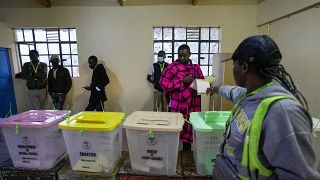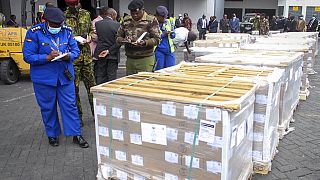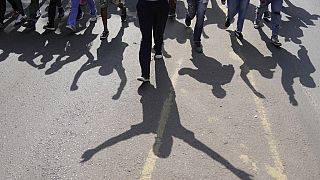Kenya
Following the death of more than 1,100 people in violence after the 2007 election, technology was proposed as a way of bolstering transparency around polls and reducing the delay in announcing results.
The 2013 and 2017 elections therefore saw results transmitted electronically and biometrics used to register voters and identify them. Biometric voter registration has been a success, boosting the electoral roll from 14.3 million in 2013 to 19.6 million in 2017. 22.1 million Kenyans are expected to vote this year on August 9.
Despite previous instances, the use of technology remains a source of worry for some poll watchdogs.
"The only major positive aspect of the technology which has come to Kenya, as I said, was voter registration, I think that has worked very well", Mulle Musau, a National Coordinator Elections Observation Group (ELOG) judges. "However, there have been more problems in my view than there have been the benefits. That's just one aspect of it. The major problems that we have been having with technology is the fact that it has made our elections much more complex."
Technology comes into play two times on election day. First, voters provide their fingerprints for identification against a digital database; then, when polling stations close and votes are counted, the official form displaying the outcome from each polling station is photographed and transmitted digitally.
Back-up kits
The Independent Electoral and Boundaries Commission assured precautions are in place to avoid any failure. For example, more than 55,000 electronic machines used for identifying voters and sending results have been deployed across the country, and each is powered by two stand-alone batteries. "It requires internet only when it is transmitting results. It is offline. It cannot be hacked," said Justus Nyang'aya, an IEBC official.
Election officials also say back-up kits have been provided, and polling officers can fall back on manual methods as a last resort.
But there is no such thing as zero risk. "We don't know with certainty that the system of transmission will work 100%, that's where the problem is. The second part of the technology problem lies with the identification process, and this is much more of a political problem than a technical problem (referring to parties disagreeing on whether to use manual registers if the digital identification kits fail, ed)", Musau says.
Distrust in electronic ballot counting and violent post-electoral memories remain vivid in Kenya.
British firm Smartmatic, which is the software provider for this election, has denied criticism that its technology -- used in polls from Uganda to Venezuela and the Philippines -- has flaws.
The Kenyan cabinet Secretary for Interior declared Thursday that August 9- election day- would be a public holiday.
To inspire with confidence
When the Independent Electoral and Boundaries Commission (IEBC) ran a test in June, less than half of the 2,900 polling stations successfully transmitted results.
Another rehearsal in July, across a reduced number of locations, saw a 92 percent rate, but the outcome didn't inspire confidence.
"We have 46,233 polling stations... So that's still a grey area. We don't know with certainty that the system of transmission will work 100 percent," said Mulle Musau from the Elections Observation Group, a Kenyan poll watchdog.
This year, nearly 1,300 polling stations are in areas with little to no internet coverage, an improvement on the last election when 11,000 locations were in the dark.
The IEBC says results will be transmitted from these locations by satellite, and that precautions are in place to avoid any failure.











00:28
Nairobi hawker shot at close range by police declared brain dead
01:50
Faith Kipyegon falls short of historic sub-four minute mile but vows to keep pushing
Go to video
Kenya's Interior minister accuses protesters of coup attempt after deadly demos
00:48
Death toll in Kenyan anti-government protests rises to 16, says rights group
01:40
Kenya protests turn violent as court, activists demand justice for victims of police brutality
01:07
Kenya prepares for first anniversary of Finance Bill protests